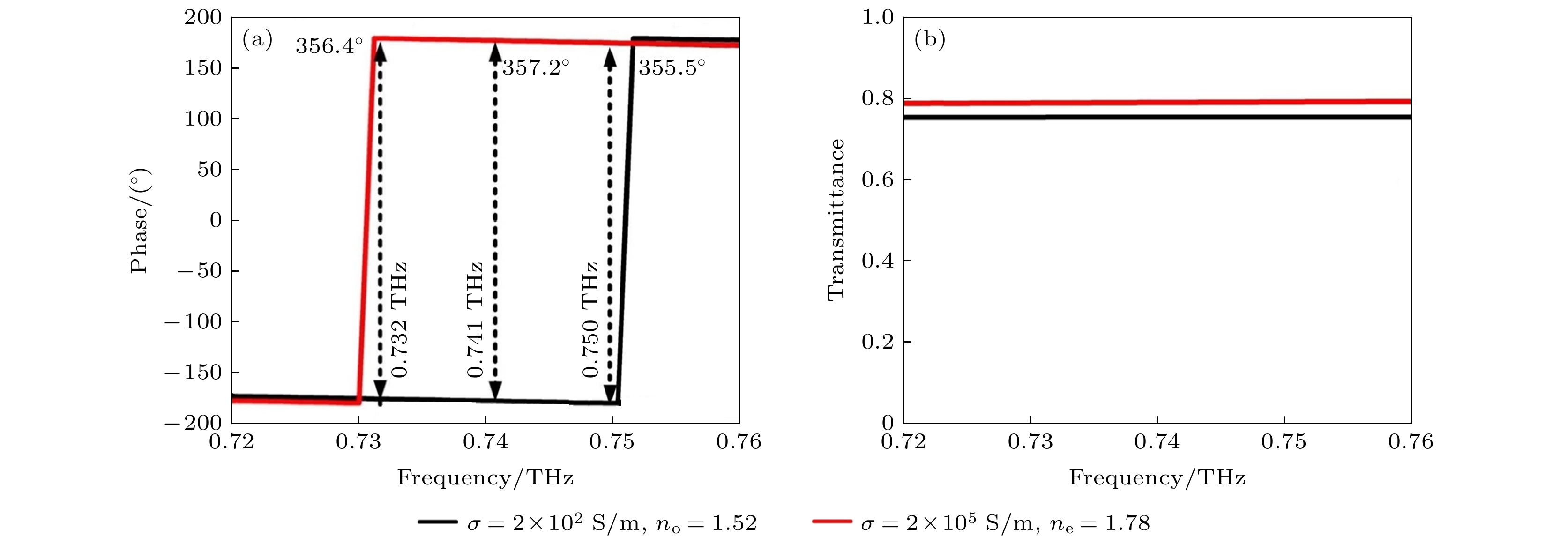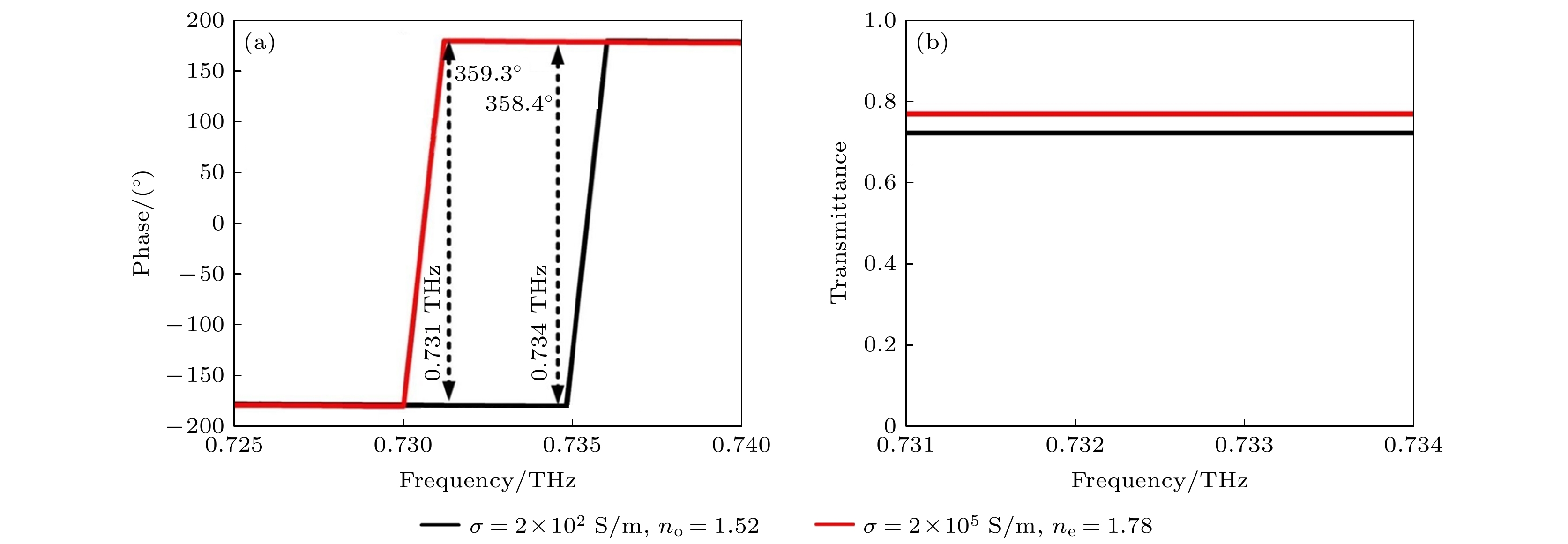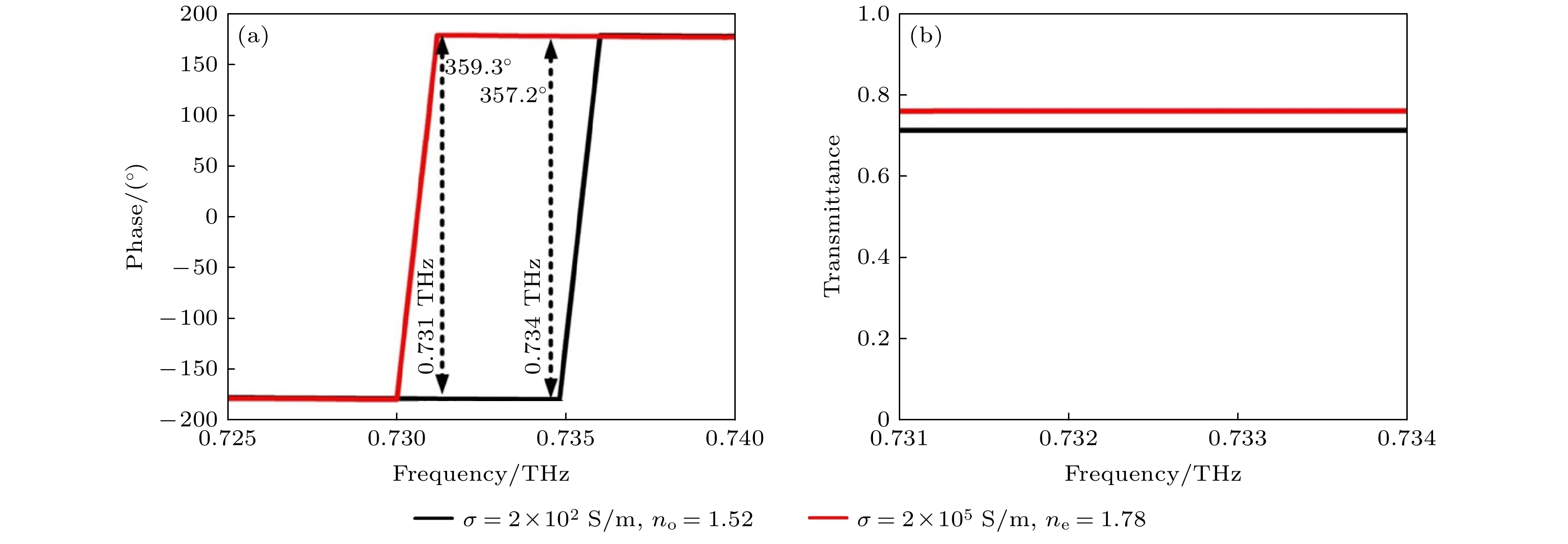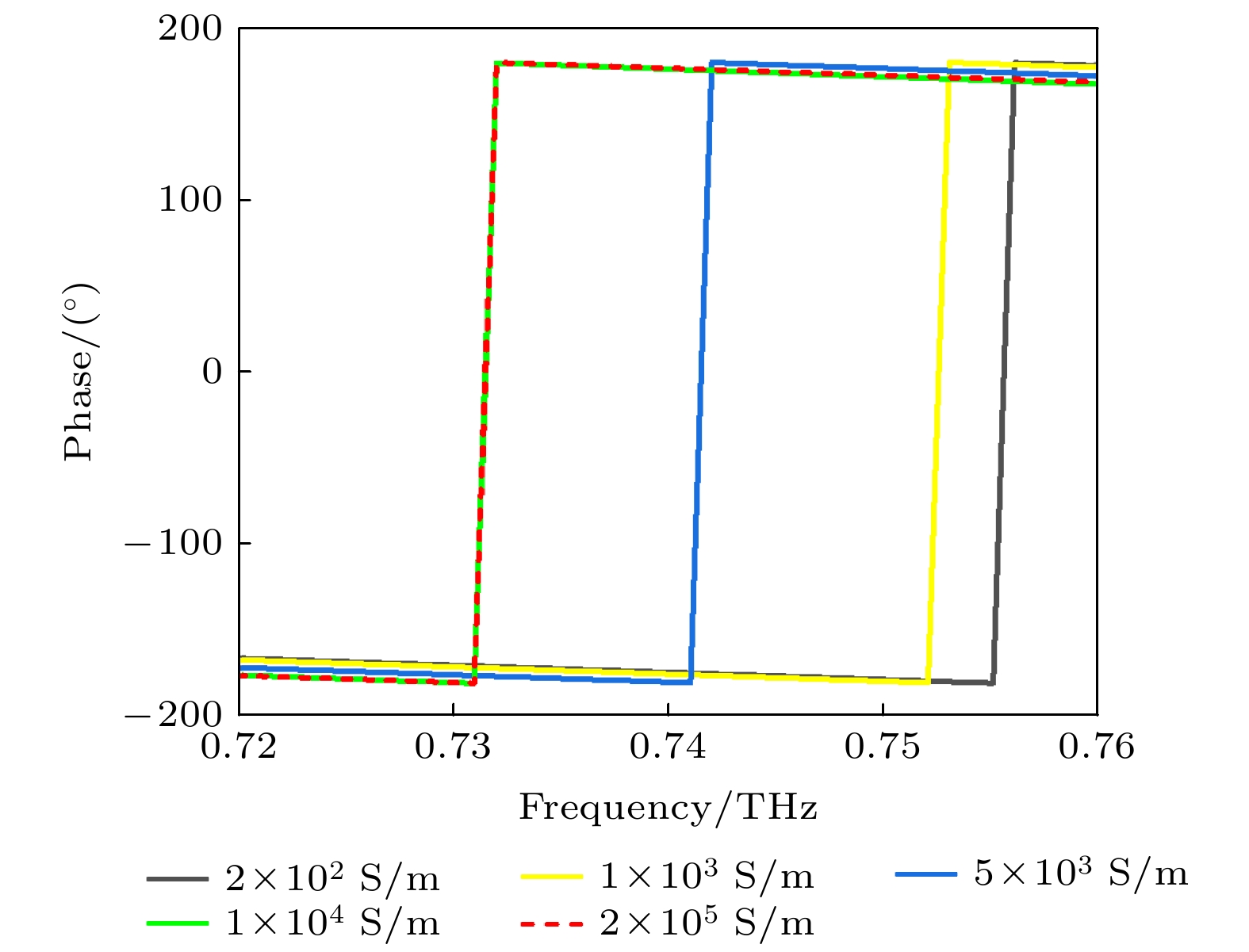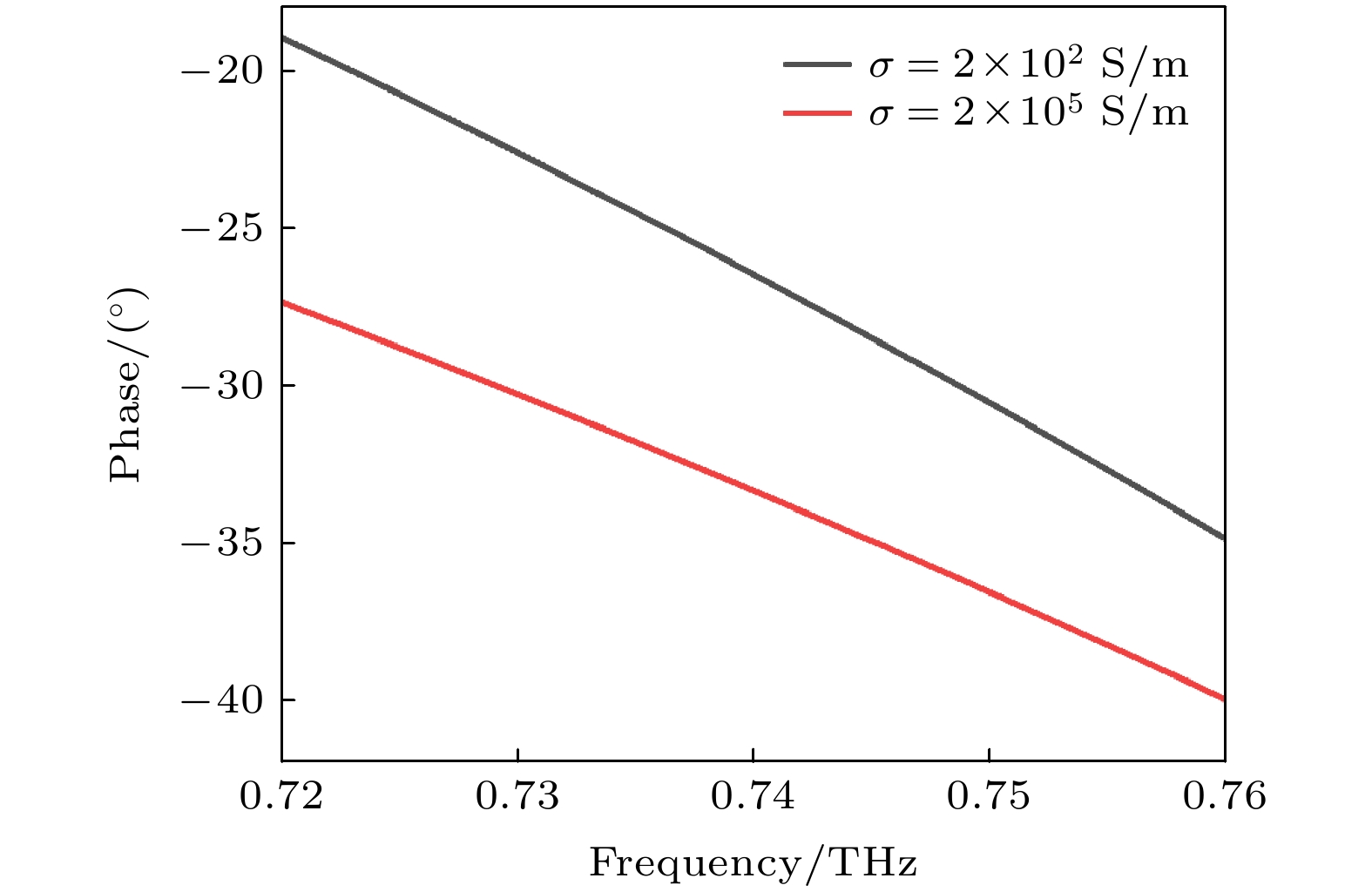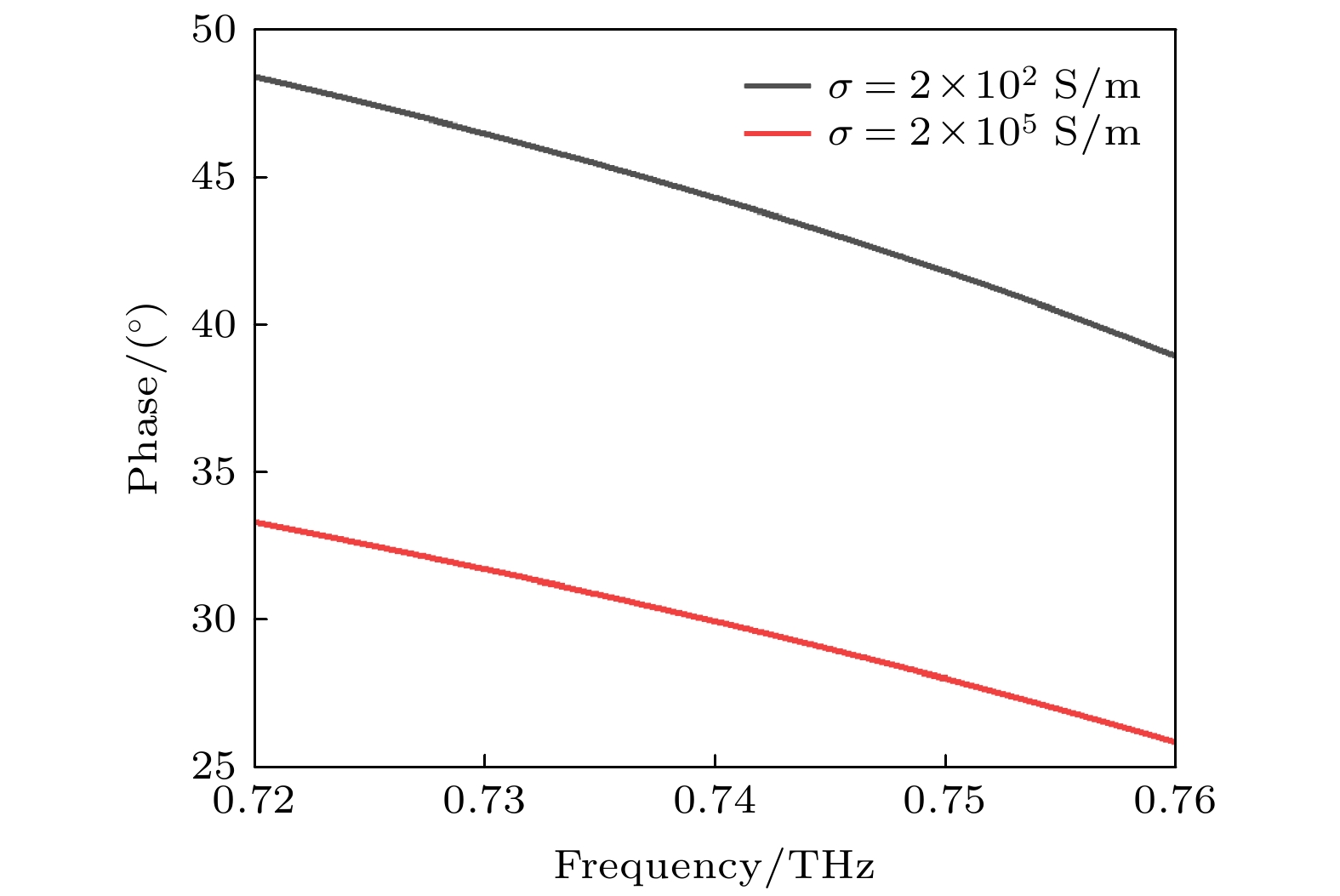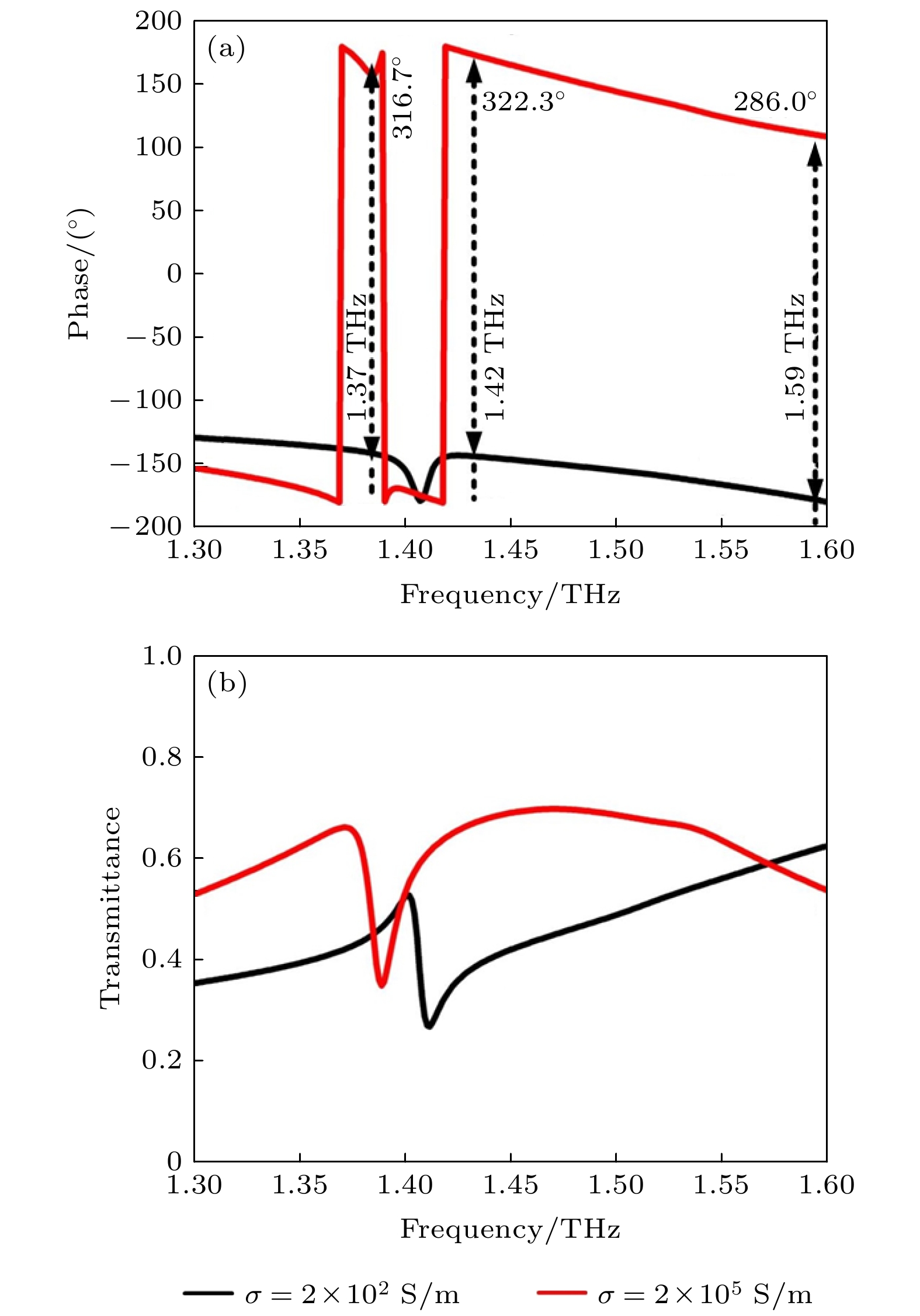-
With its rapid development, the terahertz technology is widely used in radar, imaging, remote sensing and data communication. As one of terahertz wave devices, the terahertz phase shifter has become a research hotspot. The existing phase shifters have the disadvantages of large volume, high power consumption and small phase shifting. In the present work, a tunable terahertz phase shifter with liquid crystal and vanadium dioxide is proposed. It is composed of an upper vanadium dioxide embedded metal layer, a liquid crystal, a lower vanadium dioxide embedded metal layer, and a silicon dioxide substrate in sequence from top to bottom. The liquid crystal is sandwiched between the upper and lower vanadium dioxide embedded metal layer. The phase of the device can be controlled by both the phase transition characteristics of vanadium dioxide and the birefringence of liquid crystal. By changing the external applied temperature, the conductivity of vanadium dioxide is changed, and the phase of the device shifts accordingly. Likewise the refractive index of the liquid crystal changes under different externally applied voltages. Finally, the phase of the proposed device can be effectively controlled in a terahertz range by both externally applied temperature and voltage. The phase shift characteristics of the device are analyzed by using software CST studio. The results verify that the terahertz phase shifter can achieve a maximum phase shift of 355.37° at f = 0.736 THz and a phase shift is larger than 350° in a range of 0.731–0.752 THz (bandwidth 22 GHz). Therefore, compared with the traditional phase shifter, this kind of phase change material-metasurface composite structure provides a new idea for flexibly manipulating the terahertz beam. And it is expected to be widely used in terahertz imaging, terahertz wireless and other fields.
-
Keywords:
- metasurface /
- phase-change materials /
- terahertz /
- active modulation
[1] Vieweg N, Fischer B M, Reuter M, Kula P, Dabrowsk R, Celik M, Frenking G, Koch M, Jepsen P U 2012 Opt. Express 20 28249
 Google Scholar
Google Scholar
[2] Kohler R, Tredicucci A, Beltram F, Beere E, Linfield H, Davies G, Ritchie D, Lotti R, Rossi F 2002 Nature 417 156
 Google Scholar
Google Scholar
[3] Jansen C, Wietzke S, Peters O, Scheller M, Vieweg N, Salhi M, Krumbholz N, Jördens C, Hochrein T, Koch M 2010 Appl. Opt. 49 E48
 Google Scholar
Google Scholar
[4] Xiang F, Huang W, Li D, Zhou L, Guo Z, Li J 2020 Opt. Lett. 45 1978
 Google Scholar
Google Scholar
[5] Spada L, Vegni L 2016 Opt. Express 24 5763
 Google Scholar
Google Scholar
[6] 李晓楠, 周璐, 赵国忠 2019 68 238101
 Google Scholar
Google Scholar
Li X N, Zhou L, Zhao G Z 2019 Acta Phys. Sin. 68 238101
 Google Scholar
Google Scholar
[7] Li P, Liu J, Sun B, Huang N 2015 IEEE Photonics Technol. Lett. 27 752
 Google Scholar
Google Scholar
[8] Lai W, Yuan H, Fang H 2019 J. Phys. D 53 125109
[9] Xie J, Zhu W, Rukhlenko D, Xiao F, He C, Geng J, Liang X, Jin R, Premaratne M 2018 Opt. Express 26 5052
 Google Scholar
Google Scholar
[10] Wang B, Wang G, Sang T, Wang L 2017 Sci. Rep 7 41373
 Google Scholar
Google Scholar
[11] Chen C, Pan C, Hsieh C, Pan R 2004 14th International Conference on Ultrafast Phenomena, Technical Digest (CD) WB6
[12] Grigoryeva Y, Sultanov A, Kalinikos A 2011 Electron. Lett. 47 35
 Google Scholar
Google Scholar
[13] Han Z, Ohno S, Tokizane Y, Nawata K, Notake T, Takida Y, Minamide H 2017 Opt. Express 25 31186
 Google Scholar
Google Scholar
[14] Chodorow U, Parka J, Strzezysz O, Mazur R, Morawiak P, Pałka N 2017 Mol. Cryst. Liq. Cryst. 657 51
 Google Scholar
Google Scholar
[15] Ibrahim A, Shaman N, Sarabandi K 2018 IEEE Tran. Terahertz Sci. Technol. 8 666
 Google Scholar
Google Scholar
[16] Inoue Y, Kubo H, Shikada T, Moritake H 2019 Macromol. Mater. and Eng. 304 563
[17] Ji Y, Fan F, Xu S, Yu P, Chang J 2019 Nanoscale 11 4933
 Google Scholar
Google Scholar
[18] Han J, Cao X, Gao J, Li J, Yang H, Zhang C, Li T 2019 Opt. Express 27 34141
 Google Scholar
Google Scholar
[19] Zhang J, Yang B, Han X, He X, Zhang J, Huang J, Chen B, Xu Y, Xie L 2020 Appl. Phys. A 126 199
 Google Scholar
Google Scholar
[20] Fan F, Hou Y, Jiang W, Wang H, Chang J 2012 Appl. Optics 51 4589
 Google Scholar
Google Scholar
[21] Wang L, Lin W, Liang X, Wu B, Hu W, Zheng G, Jin B, Qin Q, Lu Q 2012 Opt. Mater. Express 2 1314
 Google Scholar
Google Scholar
-
图 1 (a)相变材料(二氧化钒)嵌入超表面组成复合结构太赫兹移相器示意图; (b) 太赫兹移相器单元三维结构; (c)二氧化钒嵌入超表面复合结构(上金属层); (d) 二氧化钒嵌入超表面复合结构(下金属层)
Figure 1. (a) Schematic diagram of the proposed terahertz phase shifter based on vanadium dioxide embedded metasurface composite structure; (b) three-dimensional structure diagram of unit cell; (c) vanadium dioxide embedded metasurface composite structure (i.e. top layer); (d) vanadium dioxide embedded metasurface composite structure (i.e. bottom layer)
图 2 初始条件为上层VO2高导态, 下层VO2高阻态, 随着外部温度改变最终条件为上层VO2高导态, 下层VO2高导态时太赫兹移相器的相移曲线、太赫兹波透射系数: (a)相移曲线; (b)太赫兹波透射系数
Figure 2. Phase shift and transmission coefficient of terahertz phase shifter. The initial conditions are high conductivity state of upper VO2 layer and high resistance state of lower VO2 layer. With the change of external temperature, the final conditions are high conductivity state of upper VO2 layer and high conductivity state of lower VO2 layer: (a) Phase shift; (b) transmission coefficient of terahertz phase shifter.
图 3 初始条件为上层VO2高阻态(电导率σ = 200 S/m), 下层VO2高导态(电导率σ = 2 × 105 S/m), 随着外部温度改变最终条件为上层VO2高导态, 下层VO2高导态时太赫兹移相器的相移曲线、太赫兹波透射系数: (a)相移曲线; (b)太赫兹波透射系数
Figure 3. Phase shift and transmission coefficient of terahertz phase shifter. The initial conditions are high resistance state of upper VO2 layer and high conductivity state of lower VO2 layer. With the change of external temperature, the final conditions are high conductivity state of both upper and lower VO2 layers: (a) Phase shift; (b) transmission coefficient of terahertz phase shifter.
图 4 初始条件为上层VO2高阻态(电导率σ = 200 S/m), 下层VO2高阻态, 随着外部温度改变最终条件为上层VO2高导态(电导率σ = 2 × 105 S/m), 下层VO2高导态时太赫兹移相器相移曲线、太赫兹波透射系数: (a)相移曲线; (b)太赫兹波透射系数
Figure 4. Phase shift and transmission coefficient of terahertz phase shifter. The initial conditions are high resistance state of both upper and lower VO2 layers. With the change of external temperature, the final conditions are high conductivity state of both upper and lower VO2 layers: (a) Phase shift; (b) transmission coefficient of terahertz phase shifter.
图 5 初始条件为上层VO2高导态(电导率σ = 2 × 105 S/m), 下层VO2高导态, 随着外部温度改变最终条件为上层VO2高阻态(电导率σ = 200 S/m), 下层VO2高阻态时太赫兹移相器相移曲线、太赫兹波透射系数: (a)相移曲线; (b)太赫兹波透射系数
Figure 5. Phase shift curve and transmission coefficient of terahertz phase shifter. The initial conditions are high conductivity state of both upper and lower VO2 layers. With the change of external temperature, the final conditions are high resistance state of both upper and lower VO2 layers: (a) Phase shift curve; (b) transmission coefficient of terahertz phase shifter.
图 9 当太赫兹波入射角θ = 60°时, 太赫兹移相器的最大移相频率点相移曲线、太赫兹波透射系数: (a)相移曲线; (b)太赫兹波透射系数
Figure 9. Phase shift curve and terahertz wave transmission coefficient of the proposed terahertz phase shifter when the incident angle of terahertz wave is 60°: (a) Phase shift curve; (b) terahertz wave transmission coefficient.
图 11 当太赫兹波入射角θ = 80°时, 太赫兹移相器的最大移相频率点相移曲线、太赫兹波透射系数: (a)相移曲线; (b)太赫兹波透射系数
Figure 11. Phase shift curve and terahertz wave transmission coefficient of the proposed terahertz phase shifter when the incident angle of terahertz wave is 80°: (a) Phase shift curve; (b) terahertz wave transmission coefficient.
-
[1] Vieweg N, Fischer B M, Reuter M, Kula P, Dabrowsk R, Celik M, Frenking G, Koch M, Jepsen P U 2012 Opt. Express 20 28249
 Google Scholar
Google Scholar
[2] Kohler R, Tredicucci A, Beltram F, Beere E, Linfield H, Davies G, Ritchie D, Lotti R, Rossi F 2002 Nature 417 156
 Google Scholar
Google Scholar
[3] Jansen C, Wietzke S, Peters O, Scheller M, Vieweg N, Salhi M, Krumbholz N, Jördens C, Hochrein T, Koch M 2010 Appl. Opt. 49 E48
 Google Scholar
Google Scholar
[4] Xiang F, Huang W, Li D, Zhou L, Guo Z, Li J 2020 Opt. Lett. 45 1978
 Google Scholar
Google Scholar
[5] Spada L, Vegni L 2016 Opt. Express 24 5763
 Google Scholar
Google Scholar
[6] 李晓楠, 周璐, 赵国忠 2019 68 238101
 Google Scholar
Google Scholar
Li X N, Zhou L, Zhao G Z 2019 Acta Phys. Sin. 68 238101
 Google Scholar
Google Scholar
[7] Li P, Liu J, Sun B, Huang N 2015 IEEE Photonics Technol. Lett. 27 752
 Google Scholar
Google Scholar
[8] Lai W, Yuan H, Fang H 2019 J. Phys. D 53 125109
[9] Xie J, Zhu W, Rukhlenko D, Xiao F, He C, Geng J, Liang X, Jin R, Premaratne M 2018 Opt. Express 26 5052
 Google Scholar
Google Scholar
[10] Wang B, Wang G, Sang T, Wang L 2017 Sci. Rep 7 41373
 Google Scholar
Google Scholar
[11] Chen C, Pan C, Hsieh C, Pan R 2004 14th International Conference on Ultrafast Phenomena, Technical Digest (CD) WB6
[12] Grigoryeva Y, Sultanov A, Kalinikos A 2011 Electron. Lett. 47 35
 Google Scholar
Google Scholar
[13] Han Z, Ohno S, Tokizane Y, Nawata K, Notake T, Takida Y, Minamide H 2017 Opt. Express 25 31186
 Google Scholar
Google Scholar
[14] Chodorow U, Parka J, Strzezysz O, Mazur R, Morawiak P, Pałka N 2017 Mol. Cryst. Liq. Cryst. 657 51
 Google Scholar
Google Scholar
[15] Ibrahim A, Shaman N, Sarabandi K 2018 IEEE Tran. Terahertz Sci. Technol. 8 666
 Google Scholar
Google Scholar
[16] Inoue Y, Kubo H, Shikada T, Moritake H 2019 Macromol. Mater. and Eng. 304 563
[17] Ji Y, Fan F, Xu S, Yu P, Chang J 2019 Nanoscale 11 4933
 Google Scholar
Google Scholar
[18] Han J, Cao X, Gao J, Li J, Yang H, Zhang C, Li T 2019 Opt. Express 27 34141
 Google Scholar
Google Scholar
[19] Zhang J, Yang B, Han X, He X, Zhang J, Huang J, Chen B, Xu Y, Xie L 2020 Appl. Phys. A 126 199
 Google Scholar
Google Scholar
[20] Fan F, Hou Y, Jiang W, Wang H, Chang J 2012 Appl. Optics 51 4589
 Google Scholar
Google Scholar
[21] Wang L, Lin W, Liang X, Wu B, Hu W, Zheng G, Jin B, Qin Q, Lu Q 2012 Opt. Mater. Express 2 1314
 Google Scholar
Google Scholar
Catalog
Metrics
- Abstract views: 10660
- PDF Downloads: 256
- Cited By: 0















 DownLoad:
DownLoad:
